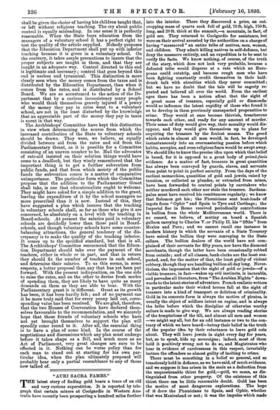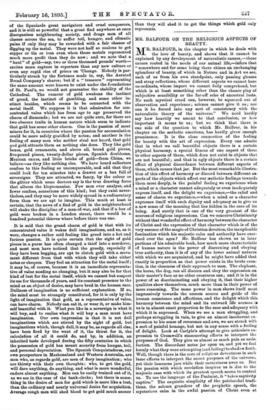"ATTRI SACRA FAMES"
TIRE latest story of finding gold bears a trace of an old and very curious superstition. It is reported by tele- graph that certain miners at Coolgardie in Western Aus- tralia have recently been prospecting a hundred miles further into the interior. There they discovered a prize, an out- cropping mass of quartz rock full of gold, 70 ft. high, 750 ft. long, and 20 ft. thick at the summit,—a mountain, in fact, of gold ore. They returned to Coolgardie for assistance, but were on their arrival arrested by the authorities on a charge of having " massacred " an entire tribe of natives, men, women, and children. They admit killing natives in self-defence, but deny the massacre entirely, and an expedition is to be sent to verify the facts. We know nothing, of course, of the truth of the story, which does not look very probable, because a defeated tribe would disperse at a rate which no Euro- peans could outstrip, and because rough men who have been fighting constantly credit themselves in their half- drunk talk with atrocities which they never committed ; but we have no doubt that the tale will be eagerly re- peated and believed all over the world. From the earliest ages there has been a notion afloat that the sight of a great mass of treasure, especially gold or diamonds, would so influence the latent cupidity of those who found it as to develop in them previously unsuspected propensities to crime. They would at once become thievish, treacherous towards each other, and ready for any amount of murder. Their sense of duty would give way, their morality would die; appear, and they would give themselves up to plans for acquiring the treasure by the foulest means. The greed which exists in almost all men would, in fact, be developed instantaneously into an overmastering passion before which habits, scruples, and even religious fears would be swept away. We should like to know the precise idea upon which that belief is based, for it is opposed to a great body of primcgacie evidence. As a matter of fact, treasure in great quantities has always been conveyed by guards, slaves, and servants from point to point in perfect security. From the days of the earliest monarchies, quantities of gold and jewels, raised by taxation, or collected as plunder, or extracted from mines, have been forwarded to central points by caretakers who neither murdered each other nor stole the treasure. Sardana- pains must have received his remittances regularly; we know that Solomon got his ; the Phcenicians sent boat-loads of ingots from " Ophir " and Spain to Tyre and Carthage; the Imperial fisc in Rome received periodically contributions in bullion from the whole Mediterranean world. There is no record, we believe, of mutiny on board a Spanish galleon carrying to Charles V. or Philip IL his " fifths " from Mexico and Peru ; and we cannot recall one instance in modern history in which the servants of a State Treasury have seized the bullion they were conveying to the State cellars. The bullion dealers of the world have not com- plained of their servants for fifty years, nor have the diamond merchants, though the latter have been occasionally robbed from outside; and of all classes, bank-clerks are the least sus- pected, and, for the matter of that, the least guilty of violent robbery, though they are handling bullion all day long. Never- theless, the impression that the sight of gold or jewels—of a visible treasure, in fact—wakes up evil instincts, is incurable, and pervades all literature, from "The Arabian Nights" down- wards to the latest stories of adventure. French realistic writers in particular make their wicked heroes fall at the sight of treasure into a kind of transport or delirium of criminality. Gold in its concrete form is always the motive of pirates, is usually the object of soldiers intent on rapine, and is always the bribe before which the discipline of otherwise worthy sailors is made to give way. We are always reading stories of the temptations of the till, and almost all men and women —we might say all, but for an odd instance or two to the con- trary of which we have heard—betray their belief in the truth of the popular idea by their reluctance to leave gold coin about. They will leave jewels in sight every day for years, but, so to speak, hide up sovereigns; indeed, most of them hold it positively wrong not to do so, and Magistrates who hear in evidence of carelessness in this respect, invariably lecture the offenders as almost guilty of inciting to crime.
There must be something in a belief so general, and so tenaciously held in defiance, as we have said, of much evidence, and we suppose it has arisen in the main as a deduction from the unquestionable thirst for gold,—gold, we mean, as dis- tinguished from other property. Of the existence of this thirst there can be little reasonable doubt. Gold has been the motive of most dangerous explorations. The hope of it drew the Phoinicians to Spain, and Ophir, whethez that was Manicaland or not ; it was the impulse which made of the Spaniards great navigators and cruel conquerors, and it is still so powerful that a great find anywhere at once disorganises neighbouring society, and drags men of all classes across the sea, to suffer toil, hunger, and climatic pains if only they may be rewarded with a fair chance of digging up the metal. They were not half so zealous to get copper or tin or iron even when those metals represented much more profit than they do now ; and we note that a "haul" of gold—say, two or three thousand pounds' worth— excites more rapture in reporters than any new culture or even any rapid rise of prices on 'Change. Nobody is par- ticularly struck by the fortunes made in, say, the Aerated Bread Company's shares; but if a " treasure " representing the same amount were known to exist under the foundations of St. Paul's, we would not guarantee the stability of the Cathedral. The rumour of gold awakens the instinct of greed, the instinct of gambling, and some other in- stinct besides, which seems to be connected with the metal itself. We suppose it is that admiration for con- centrated value which has from age to age preserved the charm of diamonds ; but we are not quite sure, for there are two obscure traits in human nature which seem to indicate that gold has some other charm. One is the passion of most misers for it, in countries where the passion for accumulation could be more safely gratified by notes; and another is the feeling of many men who neither steal nor hoard, that gold quei gold attracts them as nothing else does. They like gold boxes, gold ornaments, and above all, broad gold pieces, five-pound pieces, twenty-dollar pieces, Spanish doubloona, Mexican onza.s, and little bricks of gold—from China, we believe—as they like nothing else. We have heard colleetors confess to this feeling as unconquerable, and add that they could look for ten minutes into a drawer or a box full of sovereigns. They are attracted, we fancy, by the colour or the glitter which some doctors say is the true drawing force that allures the kleptomaniac. Few men ever analyse, and fewer confess, sensations of this kind; but they exist never- theless, and they may be more widely spread in a rudimentary form than we are apt to imagine. This much at least is certain, that the news of a find of gold in the neighbourhood will shake the discipline of a man-of-war, and that if a box of gold were broken in a London street, there would be a hundred potential thieves where before there was one.
It is said that the grand charm of gold is that with its concentrated value it wakes dull imaginations, and so, as it were, changes a rather cold feeling like greed into a hot and furious passion. It is quite certain that the sight of gold pieces in a purse has often changed a thief into a murderer, and most men have noticed that the greedy, especially if they have been begging, are apt to clutch gold with a move- ment different from that with which they will take either notes or cheques. They feel an attraction for the metal itself ; it may be, of course, because it is an immediate representa- tive of value needing no changing, but it may also be for that kind of lust for the metal itself, which we cannot but suspect its use for thousands of years, and its constant presence to the mind as an object of desire, may have bred in the human race. Dullness of imagination is no sufficient explanation. If so, the mind must be strangely constituted, for it is only by the light of imagination that gold, as a representative of value, can have charm. Nobody can eat it, or wear it, or make him- self beautiful with it. What you like in a sovereign is what it will buy, and to realise what it will buy a man must have imagination. Our own impression is that it is not dull imaginations which are stirred by the sight of gold, but imaginations which, though dull, it may be, as regards all else, have been fired by the want of it, the thirst for it, the calculation of all it could do, and by, in addition, an inherited taste developed during the fifty centuries in which the possession of gold has meant security from hunger, toil, and personal depreciation. The Spanish Conquistadores, our own prospectors in Mashonaland and Western Australia, are men who, as regards gold, are men of fiery imagination; who are thirsty with their own thoughts ; who, to get the gold, will dare anything, do anything, and what is more wonderful, endure almost anything. Men can be easily trained out of it, as we see in the case of the bank-clerks ; but there is some- thing in the desire of men for gold which is more like a lust, than the ordinary and nearly universal desire for acquisition. Average rough men will shed blood to get gold much sooner than they will shed it to get the things which gold only represents.



































 Previous page
Previous page